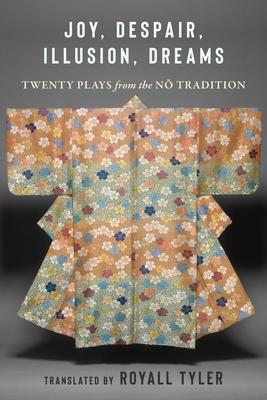Nō drama, which integrates speech, song, dance, music, mask, and costume into a distinctive art form, is among Japan's most revered cultural traditions. It gained popularity in the fourteenth century, when the actor and playwright Zeami (1363-1443) drew the favor of the shogun with his theatrical innovations. Nō's intricacies and highly stylized conventions continue to attract Japanese and Western appreciation, and a repertoire of some 250 plays is performed today.
Joy, Despair, Illusion, Dreams presents a selection of Nō plays, magnificently rendered in English by Royall Tyler, an eminent scholar and translator of classical Japanese literature. It includes both canonical and lesser-known works of Zeami's, as well as anonymous works. Several are outside the established repertoire, offering glimpses of Nō before the tradition was codified in the Edo period, and have not previously been translated into English. An introduction describes the structure, formal features, and performance conventions of Nō plays, and brief essays precede each work. Through Tyler's authoritative scholarship and keen ear for the subtlety and beauty of the language, Joy, Despair, Illusion, Dreams gives Anglophone readers access to the complex art of Nō.
Book
Joy, Despair, Illusion, Dreams: Twenty Plays from the Nō Tradition
(Write a Review)
Paperback
$38.89
Nō drama, which integrates speech, song, dance, music, mask, and costume into a distinctive art form, is among Japan's most revered cultural traditions. It gained popularity in the fourteenth century, when the actor and playwright Zeami (1363-1443) drew the favor of the shogun with his theatrical innovations. Nō's intricacies and highly stylized conventions continue to attract Japanese and Western appreciation, and a repertoire of some 250 plays is performed today.
Joy, Despair, Illusion, Dreams presents a selection of Nō plays, magnificently rendered in English by Royall Tyler, an eminent scholar and translator of classical Japanese literature. It includes both canonical and lesser-known works of Zeami's, as well as anonymous works. Several are outside the established repertoire, offering glimpses of Nō before the tradition was codified in the Edo period, and have not previously been translated into English. An introduction describes the structure, formal features, and performance conventions of Nō plays, and brief essays precede each work. Through Tyler's authoritative scholarship and keen ear for the subtlety and beauty of the language, Joy, Despair, Illusion, Dreams gives Anglophone readers access to the complex art of Nō.Paperback
$38.89